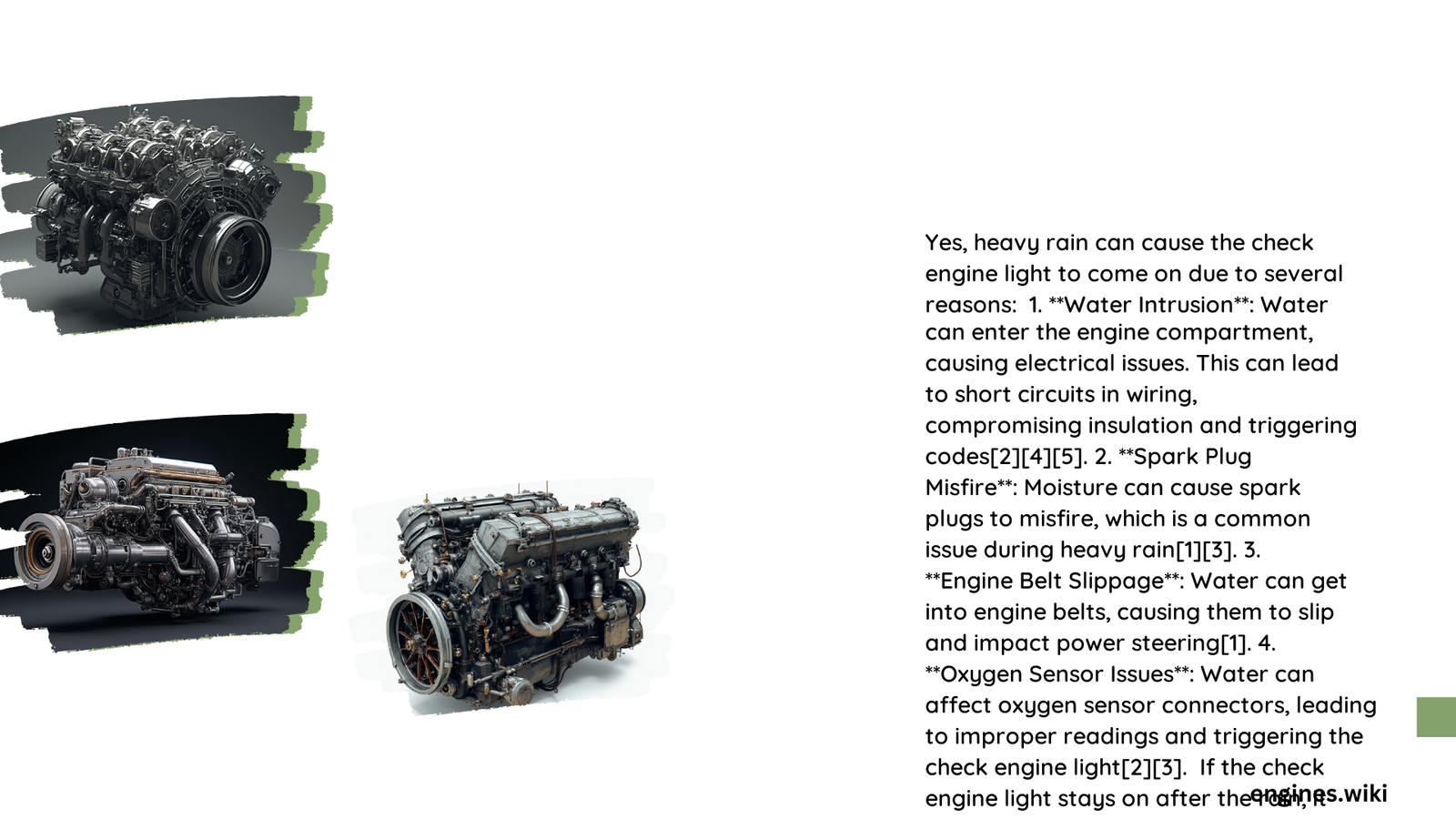Heavy rain can indeed trigger the check engine light in vehicles. This occurs when water infiltrates critical engine components, causing electrical malfunctions or mechanical issues. The severity of the problem depends on factors such as the amount of water exposure, the vehicle’s design, and its maintenance condition. Understanding how heavy rain affects your car’s engine and what to do when the check engine light comes on can help prevent costly repairs and ensure your safety on the road.
How Does Heavy Rain Affect Vehicle Engines?
Heavy rainfall can impact various parts of a vehicle’s engine system, potentially leading to the illumination of the check engine light. Here’s how different components can be affected:
- Engine Intake System: Water entering the air intake can cause hydrolock, a serious condition where water fills the cylinders and prevents the engine from turning.
- Electrical System: Moisture can lead to short circuits, sensor malfunctions, and corrosion of electrical connections.
- Fuel System: Water contamination in the fuel system can result in poor combustion and reduced engine performance.
- Exhaust System: Water entering the exhaust can cause damage to the catalytic converter and other components.
What Are the Common Symptoms of Water Damage in Engines?

When heavy rain affects your vehicle’s engine, you may notice the following symptoms:
- Check engine light illumination
- Engine misfires or rough running
- Difficulty starting the engine
- Loss of power or stalling
- Unusual noises from the engine
- Smoke from the exhaust
Can Water Damage from Heavy Rain Be Prevented?
While it’s not always possible to avoid driving in heavy rain, there are steps you can take to minimize the risk of water damage:
- Avoid driving through deep puddles or flooded areas
- Maintain proper seals and gaskets around engine components
- Regularly inspect and clean the air intake system
- Keep up with routine maintenance to ensure all systems are functioning correctly
What Should You Do If the Check Engine Light Comes On After Heavy Rain?
If your check engine light illuminates after driving in heavy rain:
- Pull over safely and turn off the engine if you notice any immediate issues
- Check for visible signs of water intrusion in the engine bay
- If safe to do so, restart the engine and monitor for unusual behavior
- Have the vehicle inspected by a professional mechanic as soon as possible
How Is Water Damage Diagnosed and Repaired?
Diagnosing and repairing water damage involves several steps:
- Visual Inspection: Mechanics will look for signs of water intrusion and damage to components.
- Diagnostic Scanning: Using OBD-II scanners to read error codes and identify affected systems.
- Component Testing: Checking individual components for proper function and signs of water damage.
- Repairs: May include drying out systems, replacing damaged parts, or in severe cases, engine rebuilding.
| Repair Type | Estimated Cost | Timeframe |
|---|---|---|
| Minor (sensor replacement) | $200 – $500 | 1-2 days |
| Moderate (electrical repairs) | $500 – $2,000 | 3-7 days |
| Major (engine rebuild) | $2,000 – $5,000+ | 1-3 weeks |
What Are the Long-Term Effects of Water Damage on Engines?
If not addressed promptly, water damage can lead to:
- Corrosion of metal components
- Electrical system failures
- Premature wear of engine parts
- Reduced engine performance and efficiency
- Increased emissions
- Potential engine failure
How Can You Protect Your Vehicle from Future Rain-Related Issues?
To safeguard your vehicle against future rain-related problems:
- Apply water-repellent treatments to vulnerable areas
- Upgrade to high-quality, water-resistant air filters
- Consider installing a snorkel for off-road vehicles
- Keep your vehicle garaged or covered during heavy rain events
- Perform regular maintenance checks, especially before rainy seasons
By understanding the potential impacts of heavy rain on your vehicle’s engine and taking preventive measures, you can reduce the likelihood of experiencing check engine light issues and costly repairs. Always prioritize safety and consult with a professional mechanic if you suspect water damage to your vehicle’s engine.
References:
1. Water Woes: Understanding the Impact of Water Damage on Your Vehicles Internal Components
2. Can Heavy Rain Damage a Car’s Engine? Here’s the Truth
3. Freak rain.. water got into the engine. | Team Chevelle
